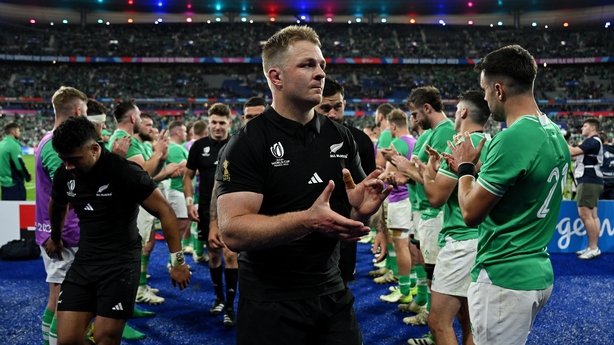Another World Cup, another quarter-final exit. But this one felt different, Ireland were so close.
Unlike 1987, 1995, 2003, 2011, 2015 and 2019, Ireland were in this going down the home stretch.
This was more 1991 but rather than a sickener at the death against us - in that year from Michael Lynagh - it was Jordie Barrett who somehow managed to hold up a certain Irish try late on that fatally damaged this assault on a spot in the last four.
When Caelan Doris knocked on, under no immediate pressure, from the restart, the writing was on the wall for Ireland.
We've all woken up with that familiar feeling after a World Cup quarter-final, but what's the view in the outside world?
The media in New Zealand were naturally delighted that their team had done the job.
Marc Hinton, writing on Stuff, did acknowledge Ireland's pedigree.
"This was a very, very good Irish team. That much has to be acknowledged. They rode a 17-test win streak into this quarterfinal, and of course had won four of their last six against the New Zealanders, including that historic series victory on Kiwi soil last year. They threw the kitchen sink at this, too, and only lost because their opponent answered the call."
But he also called the victory, "the best performance of the Ian Foster era" as the All Blacks defied some of their critics.
"The All Blacks had to dig deep," he continued, "probably even deeper than they had to in Johannesburg to deliver the previous signature performance of this cycle – to secure the 28-24 victory."
Cane offers riposte to O'Mahoney
Will Toogood, in the New Zealand Herald, pointed out that Sam Cane had had the last laugh over Peter O'Mahoney after the Munster man unfavourably compared him to previous All Blacks great Richie McCaw.
"Ireland have now still not advanced past a quarter-final fixture and O'Mahony has now joined an illustrious club of players to use fighting words and earning defeat in return."
Ouch.

In France, Martin Untersinger wrote in Le Monde that, "the All Blacks, in triumphing over Ireland at the end of one of the most memorable games in the competition's history, showed... at the Stade de France, that this black-clad team never really dies."
Over in L'equippe, Richard Escot called the game "unbreathable."
"All the balls were played, nothing was taken for granted, everything was possible. And, strongly repelling the green waves too stereotyped and therefore predictable, the All Blacks have passed the pitfall to face Argentina in the semis next Friday."
If not now, when?
While it was left to the UK's Guardian newspaper, and journalist Jonathan Liew, to sum up the mood of Irish supporters heading for the Metro after the game.
"The overwhelming sensation in these earliest twitches of aftermath is a kind of bewilderment," he wrote. "The yawning void where a World Cup semi-final was supposed to be.
"Still, this was one of those defeats that casts everything that went before it into a different kind of light. Were Ireland really favourites in this game? Were they really capable of being world champions in the first place?
"Did they know, or did they merely believe? Posterity may remember this team with fondness, will reel off those 17 consecutive wins, will lyricise the fluency and vision of Andy Farrell's men, but the prevailing sensation will always be the last."
And, while it might be a painful one for supporters hopping on a Eurostar, or heading to Charles de Gaulle Airport this morning, Liew is already looking to the future of Irish rugby.
"There is a new generation coming through, but this machine will have to be remade and refashioned for whatever comes next, and this is a process with precious few guarantees. If not now, when? There's a fairly simple answer to that question.
"But it’s not one anyone in Ireland will want to contemplate right now."
Only four years to go until the next one.








